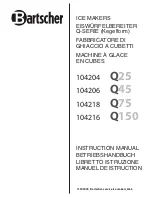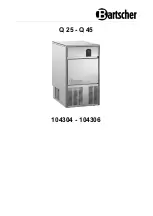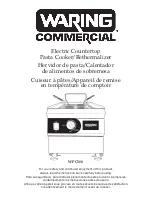
13
2.
When the desired thickness is reached, the ice sheet is
released and slides onto a cutter grid. The grid divides the
sheet into individual cubes.
3.
The water containing the rejected minerals is drained after
each freezing cycle.
4.
Fresh water enters the machine for the next ice making cycle.
5.
Cubes fall into the storage bin. When the bin is full, the ice
maker shuts off automatically and restarts when more ice is
needed. The ice bin is not refrigerated, and some melting will
occur. The amount of melting varies with room temperature.
NOTE:
As the room and water temperatures vary, so will the
amount of ice produced and stored. This means that higher
operating temperatures result in reduced ice production.
Using the Controls
1.
To start ice production, press ON/OFF.
2.
To stop ice maker operation, press ON/OFF.
NOTES:
■
Pressing the On/Off button does not shut off power to the ice
maker.
■
Allow 24 hours to produce the first batch of ice. Discard the
first 2 batches produced.
Fast Ice Mode
Select the Fast Ice feature when you have an upcoming need for
a large amount of ice and the ice bin is low or empty. Fast Ice
mode will produce a greater quantity of ice in a 24-hour period.
■
Press FAST ICE while the ice maker is on. The indicator light
will illuminate.
■
Press FAST ICE again to turn off the Max Ice feature. The
indicator light will turn off.
■
The Fast Ice mode will be on when you first turn on the
product. It will turn off after 24 hours. To turn Fast Ice back
on, press FAST ICE.
Clean
It is recommended that you clean the ice maker when the
“Cleaning Needed” light is illuminated or 9 months has elapsed
or ice production decreases significantly. To clean your ice maker,
see “Ice Maker System” in the “Cleaning” section.
Door Ajar Alarm
The Door Ajar Alarm feature sounds an alarm when the ice maker
door is open for 5 minutes. The alarm will repeat every 2 minutes.
Close the door to turn off. The feature then resets and will
reactivate when the door is left open again for 5 minutes.
Normal Sounds
Your new ice maker may make sounds that are not familiar to you.
Because the sounds are new to you, you might be concerned
about them. Most of the new sounds are normal. Hard surfaces
such as floors, walls and cabinets can make the sounds seem
louder than they actually are. The following describes the kinds of
sounds that might be new to you and what may be making them.
■
You will hear a buzzing sound when the water valve opens to
fill the water pan for each cycle.
■
Rattling noises may come from the flow of the refrigerant or
the water line. Items stored on top of the ice maker can also
make noises.
■
The high-efficiency compressor may make a pulsating or high
pitched sound.
■
Water running over the evaporator plate may make a
splashing sound.
■
Water running from the evaporator plate to the water pan may
make a splashing sound.
■
As each cycle ends, you may hear a gurgling sound due to the
refrigerant flowing in your ice maker.
■
You may hear air being forced over the condenser by the
condenser fan.
■
During the harvest cycle, you may hear a “thud” when the ice
sheet slides from the evaporator onto the cutter grid.
■
When you first start the ice maker, you may hear water
running continuously. The ice maker is programmed to run a
rinse cycle before it begins to make ice.
■
If the ice maker is connected to a water supply pressure in
excess of 60 psi, you may hear a loud sound during water
filling associated with the flow of water through the inlet
valve. Call a licensed, qualified plumber to determine the
best method to reduce the supply water pressure (50 psi is
recommended).














































